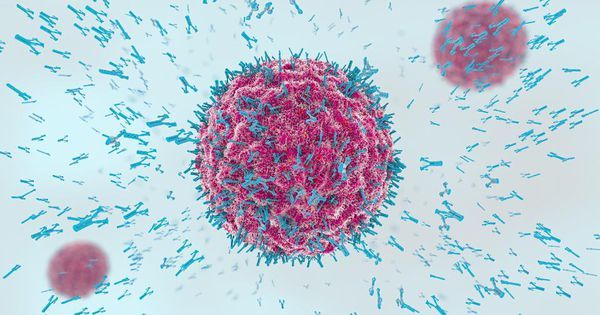To create sustainable cities, we need to use synthetic biology.



China has broken new lunar ground, successfully growing cotton on the moon for the first time. The experiment was part of the Chang’e 4 project, in which China is exploring the far side of the moon with a lander. This is the same lander that recently discovered a mysterious gel-like substance on the moon’s surface.
The cotton plant was one of several organisms encased in a mini biosphere weighing just 2.6 kilograms (5.7 lbs) with a pressure of 1 atmosphere which was aboard the lander. The organisms experienced an environment largely similar to that on Earth, however, they did have to contend with both space radiation and microgravity.
In an interview with engineering magazine IEEE Spectrum, project leader for the experiment Xie Gengxin explained more about the challenges of growing plants in the restricted environment. “The weight of the Chang’e-4 probe demanded that the weight [of the experiment] can’t exceed three kilograms,” he said. That’s why it was important to select the biological samples in the experiment carefully.

Drew Endy almost can’t talk fast enough to convey everything he has to say. It’s a wonderfully complex message filled with nuance, a kind of intricate puzzle box being built by a pioneer of synthetic biology who wants to fundamentally rejigger the living world.
Endy heads a research team at Stanford that is, as he puts it, building genetically encoded computers and redesigning genomes. What that means: he’s trying to engineer life forms to do useful things. Just about anything could come out of this toolkit: new foods, new materials, new medicines. So you are unlikely to find anyone who is more optimistic than he is about the potential for synthetic biology to solve big problems.
That’s what makes Endy so compelling when he worries about how the technology is being developed. Perhaps more than anyone else working in synthetic biology, Endy has tried to hold the community to account.

The fruit flies in Noah Whiteman’s lab may be hazardous to your health.
Whiteman and his University of California, Berkeley, colleagues have turned perfectly palatable fruit flies—palatable, at least, to frogs and birds—into potentially poisonous prey that may cause anything that eats them to puke. In large enough quantities, the flies likely would make a human puke, too, much like the emetic effect of ipecac syrup.
That’s because the team genetically engineered the flies, using CRISPR-Cas9 gene editing, to be able to eat milkweed without dying and to sequester its toxins, just as America’s most beloved butterfly, the monarch, does to deter predators.

Checkerspot, a biotech startup using microalgae to produce performance materials, announced today that it has closed its Series A financing for $13 million. The round was led by Builders VC, and included Breakout Ventures, Viking Global Investors, KdT Ventures, Plug and Play Ventures, Sahsen Ventures, and Godfrey Capital, among others.
Checkerspot combines bioengineering, chemistry, and materials science to go from microalgae to next-generation performance materials.
“This is a pretty significant milestone for us,” said Checkerspot CEO Charles Dimmler. He said the funding would support the company’s continued infrastructure development, as well as ongoing commercial activities with Beyond Surface Technologies and DIC that focus on novel triglycerides and polyols. He also said it would help complete the development of a direct-to-consumer product later this year.


Some of the most important tools in the toolbox of modern cell biologists are special chunks of DNA that act like spies, reporting on the cell’s function. The markers, known as reporter genes, allow researchers to get a sense for what cells are doing by watching genetic programs embedded in their DNA turn on and off.
Reporter genes work by encoding proteins that can be seen from outside the cell. One particularly popular reporter gene encodes something called the green fluorescent protein (GFP), which, true to its name, is a protein that glows bright green. So, if a researcher wants to learn more about how cells become neurons, they can insert the GFP gene alongside a neuronal gene into an embryo’s DNA. When the embryo’s cells turn on the neuron gene, they will also express the GFP gene, and the cells will glow green, making it easy for the researcher to see that the genetic program that encodes neuron formation is active.
As useful as this technique has been, it has a big limitation: Because light does not penetrate well through most living tissue, the GFP gene cannot be used for monitoring the activity of cells deep inside an organism. But now, Caltech’s Mikhail Shapiro has a solution. A team consisting of Shapiro, professor of chemical engineering and investigator with the Heritage Medical Research Institute, graduate student Arash Farhadi, and their colleagues, has developed a reporter gene that allows them to see genetic activity using ultrasound, which can penetrate deeply through tissue, instead of light.

“DNA is like a computer program but far, far more advanced than any software ever created.” Bill Gates wrote this in 1995, long before synthetic biology – a scientific discipline focused on reading, writing, and editing DNA – was being harnessed to program living cells. Today, the cost to order a custom DNA sequence has fallen faster than Moore’s law; perhaps that’s why the Microsoft founder is turning a significant part of his attention, and wallet, towards this exciting field.
Bill Gates is not the only tech founder billionaire that sees a parallel between bits and biology, either. Many other tech founders – the same people that made their money programming 1s and 0s – are now investing in biotech founders poised to make their own fortunes by programming A’s, T’s, G’s and C’s.
The industry has raised more than $12.3B in the last 10 years and last year, 98 synthetic biology companies collectively raised $3.8 billion, compared to just under $400 million total invested less than a decade ago. Synthetic biology companies are disrupting nearly every industry, from agriculture to medicine to cell-based meats. Engineered microorganisms are even being used to produce more sustainable fabrics and manufacture biofuels from recycled carbon emissions.